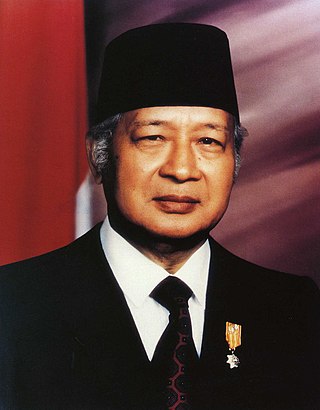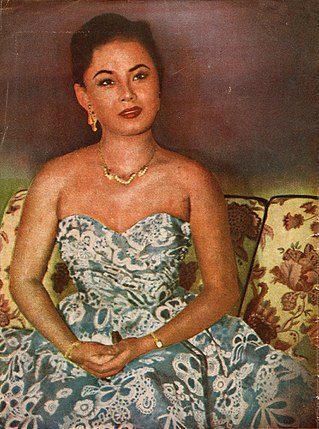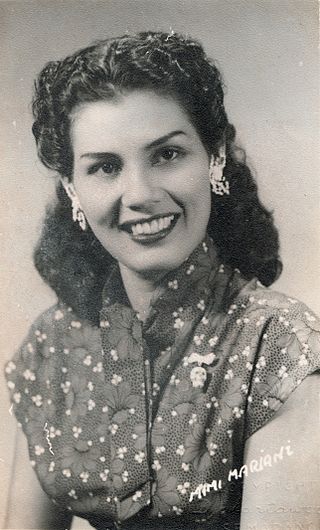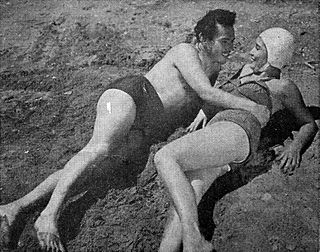
Jakarta, officially the Special Capital Region of Jakarta and formerly known as Batavia until 1949, is the capital and largest city of Indonesia. It is located on the northwest coast of Java, the world's most populous island. With more than 11.3 million inhabitants in the city proper and more than 32.5 million in the metropolitan area, Jakarta is also the largest metropolis in Southeast Asia, and serves as the diplomatic capital of ASEAN. The Special Capital Region has a status equivalent to that of a province and is bordered by two other provinces: West Java to the south and east; and Banten to the west. Its coastline faces the Java Sea to the north, and it shares a maritime border with Lampung to the west. Jakarta's metropolitan area is ASEAN's second largest economy after Singapore.

Sukarno was an Indonesian statesman, orator, revolutionary, and nationalist who was the first president of Indonesia, serving from 1945 to 1967.

Suharto was an Indonesian military officer and politician, who served as the second and the longest serving President of Indonesia. Widely regarded as a military dictator by international observers, Suharto led Indonesia as an authoritarian regime from 1967 until his resignation in 1998 following nationwide unrest. His 31-year dictatorship is considered one of the most brutal and corrupt of the 20th century, as he was central to the perpetration of mass killings against alleged communists, ethnic Chinese, irreligious people and trade unionists.

Bandung is the capital city of the West Java province of Indonesia. Located on the island of Java, Greater Bandung is the country's second-largest and second most populous metropolitan area, with over 11 million inhabitants. Situated 768 meters above sea level, approximately 140 kilometres southeast of Jakarta, Bandung has cooler year-round temperatures than most other Indonesian cities. The city lies in a river basin surrounded by volcanic mountains that provide a natural defence system, which was the primary reason for the Dutch East Indies government's plan to move the capital from Batavia to Bandung.

Permesta was a rebel movement in Indonesia that was declared on 2 March 1957 by civil and military leaders in East Indonesia. Initially the center of the movement was in Makassar, which at that time was the capital of the province of Sulawesi. However, support for the movement in South Sulawesi gradually dissipated, forcing the headquarters to move to Manado in North Sulawesi.

RCTI is a West Jakarta-based Indonesian free-to-air television broadcaster. It is best known for its soap operas, celebrity bulletins, news, and sports programmes. It was first launched in 1989, originally as a local pay television operator that broadcasts mostly foreign programmes, before switching to free-to-air terrestrial network a year later.

Hotman Paris Hutapea is an Indonesian lawyer, presenter, and businessman. He is known for his flamboyant style, high-profile clients, and luxurious lifestyle.

Indonesian literature is a term grouping various genres of South-East Asian literature.

The following is an alphabetical list of topics related to the Republic of Indonesia.

Lewat Djam Malam is a 1954 Indonesian film directed and produced by Usmar Ismail and written by Asrul Sani. Widely regarded as a classic of Indonesian cinema, the film follows an ex-soldier in his vigilante actions against corruption.

Boes Boestami was an Indonesian journalist and film actor. He was mostly known for his comedic roles.

Saputangan is a 1949 romance film from what is now Indonesia. Directed by Fred Young and starring Chatir Harro, Noorsini, and Astaman, it follows a young doctor who, after his fiancée is blinded in an automobile accident, becomes an optometrist and restores her sight.

Netty Herawaty was an Indonesian actress who made more than fifty films between 1949 and 1986.

Tiga Dara is a 1957 Indonesian musical drama film starring Chitra Dewi, Mieke Wijaya, and Indriati Iskak. Directed by Usmar Ismail for Perfini, the film follows three sisters who live with their father and grandmother. When the eldest sister, Nunung, shows no interest in marrying, her family tries unsuccessfully to find a husband for her. Nunung initially rejects the advances of a young man named Toto, who instead dates her younger sister. However, when he becomes jealous and travels from Jakarta to Bandung to profess his love, she agrees to marry him.

The opening ceremony of the 2018 Asian Games took place on Saturday, 18 August 2018, at the Gelora Bung Karno Main Stadium in Jakarta, Indonesia. The event commenced at 19:00 Indonesia Western Time (UTC+7) and ended at 21:25 local time. Wishnutama Kusubandio was the creative director of the ceremony. The ceremony featured a stage designed as a 26-meter-high mountain with a waterfall. It weighed 600 tons, was 120 meters long and 30 meters wide, and included a display of Indonesian plants and flowers, as well as a mock volcano. The volcano symbolized Indonesia's location in the "Ring of Fire" surrounding the Pacific Ocean. Host event broadcasting company International Games Broadcast Services (IGBS) filmed the televised coverage of the ceremony live internationally.

Sumiarto Suharto, better known by the stage name Mimi Mariani, was an Indonesian actress, model, and singer. Known as the first actress to portray the character Sri Asih, she was one of the Indonesian's leading lady in the 1950s and was ranked third on the list of the best Indonesian pasindhèn. Mariani was the part of Classical Indonesian Cinema.

Belenggu Masjarakat is a 1953 Indonesian drama film directed by D. Suradjio and Lie Gie San, and starring Amran S. Mouna, Mimi Mariani, Lies Permana Lestari, Wahid Chan, and S. Bono. This film marks the screen debuts of Lestari.
Sri Asih is a 2022 superhero film based on the Bumilangit character of the same name. The film was directed by Upi who co-wrote the screenplay with Joko Anwar. It is the second installment in the Bumilangit Cinematic Universe (BCU). And it stars Pevita Pearce as Alana / Sri Asih alongside Reza Rahadian, Christine Hakim, Jefri Nichol, Dimas Anggara, and Surya Saputra.

















